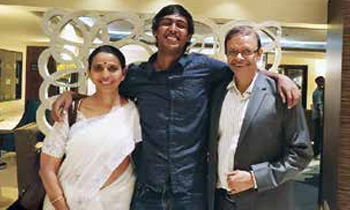The gauntlet is being thrown by a New India and it is up to the leaders of today and tomorrow to pick it up and lead us to a promised land where “the head is held high and the mind is without fear.” Will the real leaders please stand up and lead?

The heat and dust raised by the elections in Karnataka, which many had expected to be a dress rehearsal for the 2019 Parliamentary elections failed to provide any clarity on the mood of the people. But one fact that was underlined once again is the sad state of the political narrative in present times. The campaign after promising to be based on policies and issues quickly degenerated to an abusive slanging match with personal attacks and allegations and counter allegations of corruption. Surely, we deserve better as a country and one can only hope that the narrative will shift to more of development and growth in the months to come!
The underlying problem, not just in India but around the world, seems to be a lack of understanding of the fundamentals of leadership and quite often this lack of understanding is reinforced by unrealistic or misplaced expectations of people who place them in the leadership role in the first place. I am having this discussion with millennials and young managers in many corporations as well as social enterprises in the last few months and a few important common realisations are worth emphasising in this column.
First is that the role of the leader should no longer be seen as a controller and supreme commander and order giver. The long-held myth created and perpetuated from the times of Alexander the Great to Atilla the Hun to Adolf Hitler that leaders must create a band of worthy followers who dare not question any edict or wish of the leader has to be dispelled. The leader today has to have humility and connectedness and be able to understand and integrate the diverse needs and wants of Gen X, Gen Y and Gen Z team members with a truly collaborative spirit. There are no followers in today’s environment, everybody is looking for leaders to create a context and environment in which they can embark on their own voyage of leadership.
The role of the leader should no longer be seen as a controller and supreme commander and order-giver
 Ganesh and Uma with Vignesh, from 2018 batch of Symbiosis
Ganesh and Uma with Vignesh, from 2018 batch of SymbiosisSecond, leaders have to choose the right tools and mechanisms to build connectedness in their organisation. In two organisations which I have led with a modicum of success APTECH and Zensar Technologies, one initiative that always stood us in good stead was the formation of Vision Communities. These communities formed on a voluntary basis and open to all members of the organisation played a stellar role in crafting strategy, building businesses and serving as a Shadow Executive Board for the organisation. And the benefit to the participants was always a sense of being wanted, included and truly empowered.
Third, leaders have to take it upon themselves to create connected leaders and managers across the rank and file of the organisation. A true spirit and manifestation of connectedness lies in the ability of every team leader to provide regular and timely feedback, build development action plans for every team member and operate in an environment which truly embodies a five F culture—Fast, Focused, Flexible, Friendly and Fun! This has been a culture mantra that I have personally deployed in every corporate academic and social environment and which is today the name of the enterprise I founded and lead.
Fortunately, in India today, there are institutions which are encouraging their students to explore this type of leadership. A case in point is the United World College, not just the Indian one in Mulshi near Pune but the many other institutions in various other parts of the world that offer a two-year International Baccalaureate programme but more importantly, build an environment where young men and women emerge as true citizens of the world. And at University level there are exemplars like Pune’s Symbiosis School of Liberal Arts (SSLA). Having a close connect with SSLA since my nephew Vignesh just graduated from that institution, I have seen the balance in their youth mentoring and education processes, where young people are encouraged to follow their dreams, excel in their chosen vocations and choose and pursue their own path to success. Kudos to Dr Mujumdar, Dr Vidya and SSLA Chief Anita Patankar for building an institution that can truly make a difference.
And what does all this have to do with a national political agenda? Our nation prides itself on being one of the youngest in the world and hopes to reap the benefits of its demographic dividend. But do the ambitious millennials and very vocal teenagers really care about the caste and class divisions that are exploited in every election and can they get inspired by all the mud that is thrown on every aspiring politician regarding corrupt practices and many forms of sleazy behaviour? Ask any young person and what they want are clean candidates imbued with the desire to serve and build better communities, cities, states and nations. Surely that is not too much to ask? And if somebody wants to snigger and say that this is only valid for youth in cities, just have a conversation with a village youth and the aspirations and expectations are no different. The gauntlet is being thrown by a new India and it is up to the leaders of today and tomorrow to pick it up and lead us to a promised land where “the head is held high and the mind is without fear.” Will the real leaders please stand up and lead?
By Dr Ganesh Natarajan